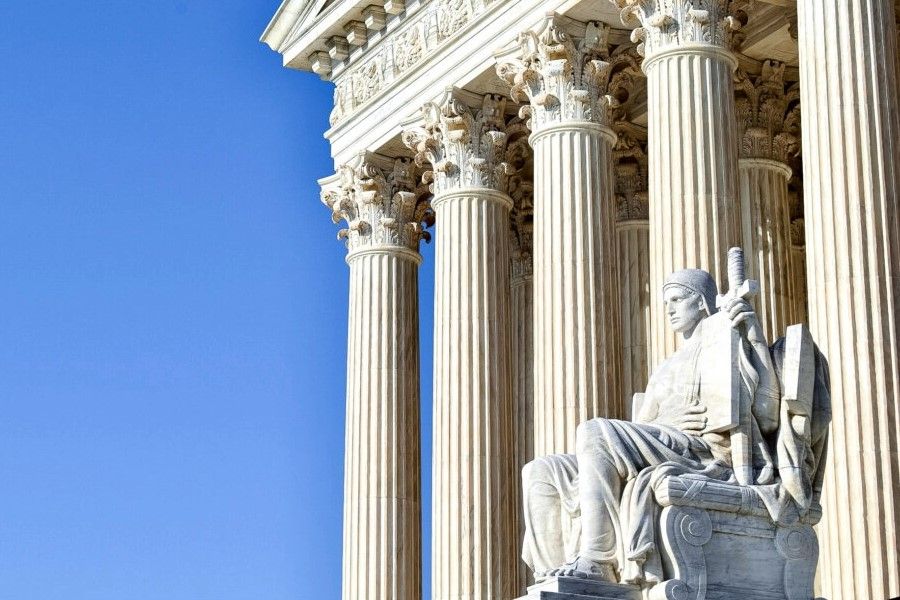A group of Democratic lawmakers is pressing the U.S. Supreme Court to support a decision by a lower court that blocked an Oregon municipal government from pursuing legal action against homeless individuals for sleeping outside.
The upcoming case, City of Grants Pass v. Johnson, scheduled for later this month, comes at a time when cities across the country are grappling with the challenges of homelessness and the expansion of homeless camps, driven in part by escalating residential rents and other factors. According to the U.S. Department of Housing and Urban Development, over 580,000 people were homeless in 2022.
In this particular case, the U.S. Court of Appeals for the Ninth Circuit ruled that Grants Pass, Oregon, was barred by the U.S. Constitution from imposing criminal or civil penalties in its attempt to enforce local laws against camping on public lands.
The appeals court ruled that under the Eighth Amendment’s protection against cruel and unusual punishment, local governments are forbidden from prosecuting individuals for sleeping outdoors when no indoor space is available. This decision has drawn criticism from conservative legal thinkers.
The Ninth Circuit upheld the July 2020 decision by U.S. Magistrate Judge Mark D. Clarke of the U.S. District Court in Oregon, who determined that Grants Pass’s “policy and practice of punishing homelessness violated the Cruel and Unusual Punishment Clause of the Eighth Amendment.”
Judge Clarke determined that Martin v. Boise, a Ninth Circuit decision from 2019, served as a precedent in the case. In that ruling, it was established that the Constitution “prohibits punishing people for engaging in unavoidable human acts, such as sleeping or resting outside when they have no access to shelter,” the judge wrote.
In Martin v. Boise, the Ninth Circuit found that “‘so long as there is a greater number of homeless individuals in [a city] than the number of available beds [in shelters],’ a city cannot punish homeless individuals for ‘involuntarily sitting, lying, and sleeping in public.'”
To “criminalize indigent, homeless people for sleeping outdoors” would be to punish them based “on the false premise they had a choice in the matter.”
To “criminalize indigent, homeless people for sleeping outdoors” would be to punish them based “on the false premise they had a choice in the matter.”
According to Paul J. Larkin and Zack Smith from the conservative Heritage Foundation, the Ninth Circuit’s decision to support the district court’s ruling is an example of “result-oriented jurisprudence at its worst, proof that an intellectually dishonest judge can reach any result he or she wants just by writing grammatically correct sentences and sprinkling in a few citations to, or quotations from, Supreme Court decisions.”
Last week, Rep. Cori Bush (D-Mo.) and 15 other members of the U.S. House of Representatives, including Alexandria Ocasio-Cortez (D-N.Y.) and Rashida Tlaib (D-Mich.), filed a friend-of-the-court brief with the Supreme Court. They contended that homeless individuals should not face criminal penalties for residing outdoors on public property.
Three U.S. senators—Ed Markey (D-Mass.), Elizabeth Warren (D-Mass.), and Bernie Sanders (I-Vt.), who aligns with the Democrats—have also endorsed the brief.
“Punishing poverty traps people in cycles of debt, unemployment, and hopelessness, increasing the likelihood someone will become chronically homeless, which makes the problem worse for everyone and therefore serves no legitimate penological purpose,” the brief states.
“While the members of Congress signing here agree that the political branches have at least partially failed homeless Americans by turning away from their historical role in ensuring broad access to affordable housing, this Court has never permitted a local government to inflict pain on its own innocent residents for the deliberate purpose of running them off and making them someone else’s burden.”
Studies have also demonstrated that “punishing homelessness” is ineffective, the brief states.
According to the brief, criminalizing homelessness “perpetuates homelessness by erecting more barriers against escaping the cycle of poverty.” Homeless people often experience worsening mental and physical health in custody, and incarceration is costly to taxpayers and makes it “even more challenging to access secure housing post-incarceration,” according to the brief.
The Biden administration, though not directly involved in the appeal, has requested the court’s permission to join the oral argument scheduled for April 22. This move signifies that the federal government views the case as significant.
Share your thoughts by scrolling down to leave a comment.













